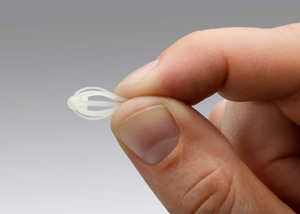New Technology Provides Sustained Relief for Managing Chronic Condition
 ENT Specialties, PC is among the first in the United States to offer a new technology recently approved by the FDA to treat nasal polyps in adults who have had previous ethmoid sinus surgery (ESS).
ENT Specialties, PC is among the first in the United States to offer a new technology recently approved by the FDA to treat nasal polyps in adults who have had previous ethmoid sinus surgery (ESS).
Nasal polyps are inflammatory growths along the lining of the nasal passages that can occur in patients suffering from chronic sinusitis. The symptoms of chronic sinusitis include nasal discharge, congestion, facial pain, and a loss of sense of smell. Many people return to their ENT specialist with recurring polyps even after undergoing previous ethmoid sinus surgery.1
ENT Specialties now offers Intersect ENT’s SINUVA Sinus Implant, placed during a routine physician office visit. SINUVA expands in the sinus cavity, delivering a steroid directly to the sinus for up to 90 days. SINUVA softens over time and can be removed at 90 days or earlier at the physician’s discretion.
“Many people suffer from recurrent nasal polyps, a debilitating condition that can greatly affect a person’s life,” says Dr. H. Russell Semm, of ENT Specialties. “Until now, existing treatments have included repeat surgery, high-dose oral steroids, or intranasal sprays that require ongoing patient compliance. We are very excited to be among the first in the U.S. to offer this innovative treatment choice to our patients.”
Positive data from the SINUVA Sinus Implant was supported by the results of the RESOLVE II pivotal study. The study demonstrated a reduction in polyps, nasal obstruction/congestion, a reduction in need for repeat sinus surgery, and an improvement in impaired sense of smell.2
To learn more about SINUVA, visit SINUVA.com. To see full prescribing information, click here.
Important Safety Information
Patients with a known hypersensitivity to the mometasone furoate drug or any of the ingredients in SINUVA, should not use SINUVA. Hypersensitivity reactions, including rash, pruritus, and angioedema have been reported with the use of corticosteroids. If corticosteroid effects such as hypercorticism and adrenal suppression appear in patients, consider sinus implant removal.
SINUVA is made from bioabsorbable polymers designed to soften over time. As the implant softens and polyps decrease, the implant may be expelled out of the nose on its own or with actions such as sneezing or forceful nose blowing. The implant can be removed 90 days after placement or earlier at the physician’s discretion. Repeat administration of SINUVA has not been studied.
As with other endoscopic sinus procedures, there are risks associated with the insertion or removal of SINUVA. SINUVA should be inserted by physicians trained in otolaryngology.
The nasal mucosa adjacent to the SINUVA Sinus Implant should be monitored for any signs of bleeding (epistaxis), irritation, infection, or perforation. Avoid the use of SINUVA in patients with nasal ulcers or trauma.
The most common adverse reactions observed in clinical studies were bronchitis, nasopharyngitis, otitis media, headache, presyncope, asthma, and epistaxis.
Patients experiencing excessive nasal bleeding, symptoms of infection or symptoms suggesting that the implant has moved, such as irritation or a choking sensation in the back of the throat, should immediately contact a healthcare professional.
Close monitoring is recommended if patients have a change of vision or a history of increased intraocular pressure, glaucoma and/or cataracts.
You may report side effects to your physician or to the FDA at 1-800-FDA-1088 or www.fda.gov/medwatch. You may also report side effects to Intersect ENT at 1-866-531-6004.
RX Only. For important risk and use information about SINUVA, please see Full Prescribing Information.
1 Wynn, R. and G. Har-El (2004). "Recurrence rates after endoscopic sinus surgery for massive sinus polyposis." Laryngoscope 114(5): 811-813.
2 Data on file, Intersect ENT. RESOLVE II CSR R 28017 Rev. 3.0 February 2017
